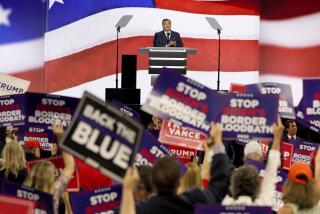The Ethan question
- Share via
WHO COULD BEAR to write an epitaph for Ethan Esparza? Ethan was celebrating at his 4th birthday party Nov. 19, playing with a new toy car in the frontyard of his Pomona home, when a gunman stepped out of an SUV and began spraying bullets into the crowd of children. After being shot, Ethan lived long enough to scramble to his mother’s room and spend his last moments gasping for breath in her arms. There are no words strong enough to express her agony or the depths of a community’s sympathy.
Police departments don’t have any words for such tragedies either, but they do have numbers. Statistics compiled by the FBI show that violent crimes nationwide rose 2.3% in 2005, the first such increase since 2001. Homicides were up 3.4%, and a separate report issued in September by the Justice Department showed a marked increase in gun violence last year.
A one-year statistical bump doesn’t necessarily signal a trend, and crime statistics are always problematic because they’re based on reported incidents; a jump might simply mean more people are going to the police, not that more crime is occurring. Further, nationwide crime patterns are extremely uneven: Violence is down in New York but up in Boston. Locally, police are concerned about a rash of gang attacks in the San Fernando Valley, but violent crime in Los Angeles as a whole has been declining for years.
But the country’s top cops don’t think the statistics are an anomaly. At a conference in August, about 300 police chiefs complained to FBI officials that a shift in national priorities toward fighting domestic terrorism was compromising their ability to fight conventional crime. Federal funding for municipal police work has been cut nearly in half since 9/11, diverted instead to anti-terrorism programs. At the same time, the Bush administration and Congress have significantly loosened federal gun-control measures such as the now-expired assault weapons ban.
On Wednesday, the Justice Department chose 18 regions for a study on why homicides are on the rise, including San Bernardino County and San Diego. Police chiefs hope this will lead to an increase in funding, but that’s not likely. Atty. Gen. Alberto R. Gonzales has made it clear that they shouldn’t expect much more help from the federal government.
It would be absurd to say that Ethan or the other victims of senseless violence died because of federal crime policies, but it’s equally absurd to think one can make it easier for criminals to obtain deadly weapons without having an effect on the murder rate. Last year, there were nearly 17,000 homicides in the United States, five times the death toll from 9/11. It may be that our focus on Middle Eastern terrorists has distracted our attention away from a bigger, entirely homegrown threat.
More to Read
Get the L.A. Times Politics newsletter
Deeply reported insights into legislation, politics and policy from Sacramento, Washington and beyond. In your inbox twice per week.
You may occasionally receive promotional content from the Los Angeles Times.










